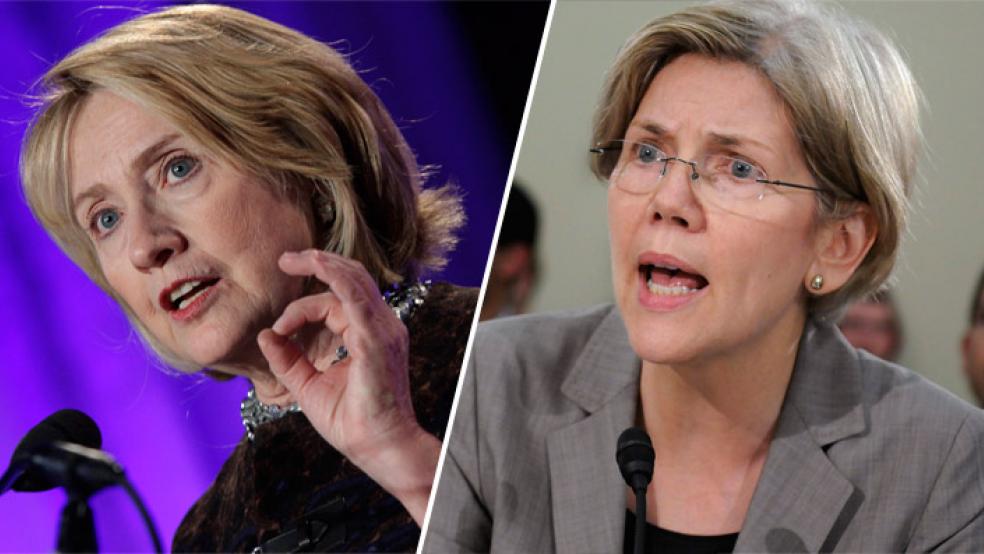Conventional political wisdom has Hillary Clinton as the odds-on favorite for the 2016 Democratic presidential nomination if she chooses to run – and most political handicappers assume she will.
While President Obama continues to react to the disastrous rollout of Obamacare, Clinton has been appearing before adoring party regulars. Assessing her strengths as the likely Democratic candidate in 2016, Whit Ayres, a GOP strategist, said recently, “She has vast experience at the highest levels of government and is married to the best political consultant in America.” She’s also, however, 65 years old and is still associated with the attack on the American diplomatic mission in Benghazi during her tenure as Secretary of State.
Related: Hillary Clinton Thrives, for Now, in Political Catbird Seat
Yet there are tensions within the Democratic Party between regulars who fawn over Hillary and Bill Clinton and the more liberal or progressive members clamoring for a break with the centrist policies of former president Bill Clinton and of President Obama.
Democrat Bill de Blasio’s resounding victory in the New York City mayoral election offered a vivid example of the growing firepower of Democratic progressives. They are certain to demand a big say in the choice of their party’s 2016 standard bearer – which could spell trouble for Hillary Clinton. It's why Elizabeth Warren, the freshman Democratic senator from Massachusetts and longtime thorn in the side of the financial and banking industry, may well become Clinton’s “nightmare scenario.”
Related: What We’ve Learned From Last Tuesday’s Elections
That, at least, is the theme of a new Warren profile in the New Republic by senior editor Noam Scheiber. Scheiber writes that Warren – the former Harvard law professor and consumer advocate – is described by progressives and Washington insiders as the Democrat best positioned to challenge Clinton from within. Warren would be undaunted by speculation about the inevitability of a Clinton nomination.
“She has an immense ... sense of destiny,” Scheiber quotes a former Warren aide as saying. “Yeah, Hillary is running. And she’ll probably win,” the aide added, according to Scheiber. “But Elizabeth doesn’t care about winning. She doesn’t care whose turn it is.”
‘Core of the Party’
The last time Clinton ran for president, a key issue was the Iraq war and how to best end it. “This time the debate will be about the power of America’s wealthiest,” Scheiber writes. “Far more than with foreign policy, which most Democrats agreed on by 2008, this disagreement will cut to the very core of the party: what it stands for and who it represents.”
To be clear, Warren has done nothing to hint she might challenge Clinton for the nomination. To the contrary, she signed on to a letter from all the female Democratic senators urging Clinton to seek the nomination, according to media reports. The primary campaign is two years off, though; a lot can happen.
On one side of the Democratic Party split is a majority of voters who are angrier, more disaffected and more populist than they’ve been in years, according to Scheiber. They are “more attuned to income inequality than before the Obama presidency and more supportive of Social Security and Medicare,” he says. These progressive Democrats are also much fonder of government regulations and red tape and more skeptical of big business than others. Writes Scheiber:
On the other side ... is a group of Democratic elites associated with the Clinton era who, though they may have moved somewhat leftward in response to the recession—happily supporting economic stimulus and generous unemployment benefits—still fundamentally believe the economy functions best with a large, powerful, highly complex financial sector. Many members of this group have either made or raised enormous amounts of cash on Wall Street. They were deeply influential in limiting the reach of Dodd-Frank, the financial reform measure Obama signed in July of 2010.
In the end, Hillary Clinton is likely to prevail and Warren would have a hard time justifying a challenge. Warren would also be hard-pressed to argue she's better equipped than Clinton to run the government and U.S. foreign policy. Yet the growing ideological divide within their party is certain to profoundly impact the course of the next presidential campaign.
Top Reads at The Fiscal Times:





